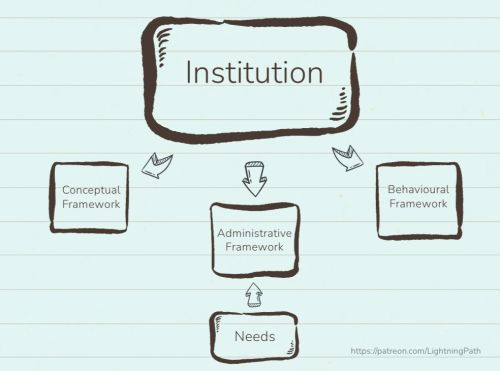Institutional Framework
An Institutional Framework is the system of conception, administration, and behaviour that structures an Institution and the actions that are undertaken within and without. An institutional framework consists of the Conceptual Framework, Administrative Framework, and Behavioural Framework.
Types
Institution > Authentic Institution, Inauthentic Institution
The Three Institutional Frameworks
Institution > Conceptual Framework
Related LP Terms
Non-LP Related Terms
Notes

The Conceptual Framework of an institution encompasses its foundational ideas, theories, and ideologies that define its purpose, objectives, and role within society. It articulates the institution's mission, core values, and the philosophical underpinnings that justify its existence. The conceptual framework is typically rooted in a specific Creation Template.
The Administrative Framework refers to the organizational structures, governance mechanisms, and operational processes that enable an institution to function effectively. It defines the hierarchy of authority, division of responsibilities, and the systems by which decisions are made and implemented.
The Behavioural Framework consists of the norms, codes of conduct, and cultural expectations that guide the actions and interactions of individuals within the institution. It encompasses both formal policies and informal practices that influence employee behavior and organizational culture.
Since institutions are formed within specific political and economic contexts, the specific form an institution takes will depend entirely on nature of the society within which it is created. Capitalist societies will generate capitalist institutions with capitalist frameworks, feudal societies will generate feudal institutions within feudal frameworks, and so on.
If we lived in a Utopian society, religions could help meet society’s need for an aligned, connected, loving, and empathic population. However since, as explained in detail in All About the System, we don’t live in a Utopian society, since we live in an exploitative society where powerful rich people extract money from a docile, indoctrinated, and compliant workforce, religion helps meets the needs for a docile, indoctrinated, and compliant workforce.
Since Capitalism is Regime of Accumulation and not a Regime of Distribution, since a Regime of Accumulation's is organized to facilitate private accumulation of abstract labour into the hands of a powerful Accumulating Class, and since the organization of society for the purposes of accumulation requires the subversion of humanity's Seven Essential Needs and the suppression of Full Human Potential, we may label all institutions within a Capitalist system, and indeed any Regime of Accumulation, as an Inauthentic Institution. Since institutions are formed within specific political and economic contexts, the specific form an institution takes will depend entirely on nature of the society within which it is created. Capitalist societies will generate capitalist institutional frameworks, feudal societies will generate feudal institutions within feudal frameworks, and so on.
Footnotes